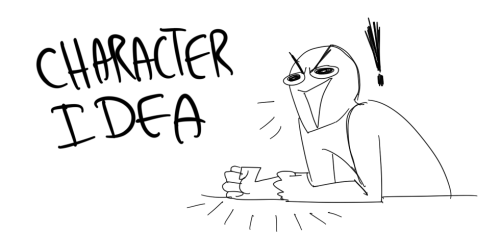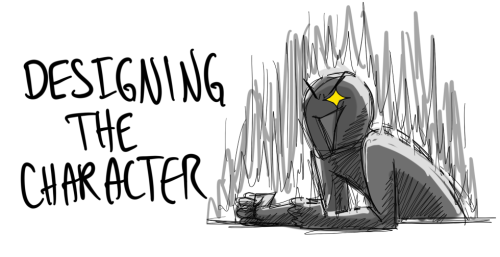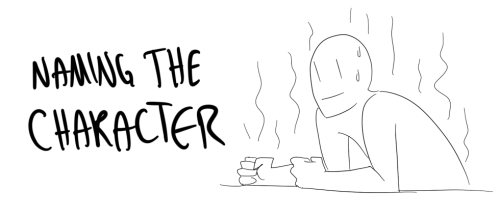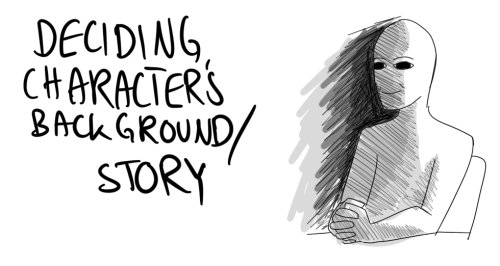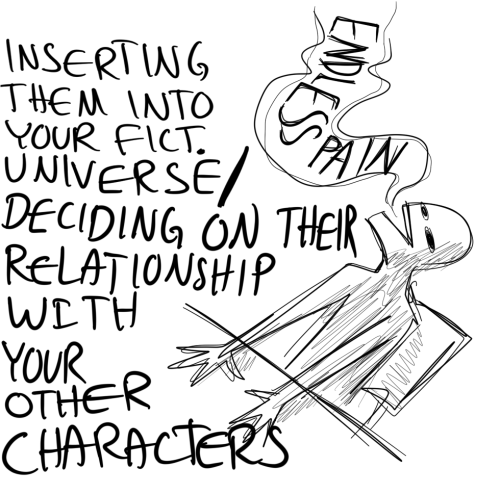Small Romance Things That Make Me Go FERAL
Small romance things that make me go FERAL
A very totally incredibly non-delulu list by Writerthreads
arm/shoulder/waist/SMALL OF THE BACK touches
HANDS BRUSHING, BUT TOO NERVOUS TO DO ANYTHING MORE
calling them by their name ("What's your opinion on this, X?") (they way they say their name makes their heart do funny things)
the way their voice goes heavy/breathy
CHIN RESTS ON THEIR SHOULDER
whispering into their ear and the way their breath tickles
non-affectionate nicknames just for them
recognising their laugh and trying to make them laugh just to hear it again
little private smirks/winks, watching their reaction when someone makes a joke
sniffing their hair/recognising their on their shampoo
eye contact so deep they feel like sinking
SMALL PECKS ON THE CORNER OF THEIR MOUTH/CHIN/FOREHEAD
recognising the sound of their footsteps
co-existing in the same space, acknowledging their presence and feeling safe
CARESSING THEIR CHEEK WITH THEIR THUMB
recognising their nervous ticks and comforting them, like putting a hand on their bouncing leg
tracing scars, freckles, moles, lines of their muscle, you name it (SCREAMS)
grinning when they blush
watching with pride as the other does a presentation/leads a mission/takes charge
making up private signals for each other
HAND KISSES
NECK KISSES
playing with their hair/brushing their hair/braiding their hair
Ah, love. That lingering warm, fuzzy feeling in your chest. I love love.
More Posts from Sparklingsilvermagnolias and Others
I hate the “Thoreau’s mom did his laundry” criticism so much, it drives me crazy.
Henry Thoreau did not go to Walden Pond because he thought it would be a fun adventure. He went into the woods because he was deeply depressed and burnt out. He was running from the horror of his brother and best friend recently dying in his arms, and the haunting memory of causing the Fairhaven Bay fire. His friend Ellery Channing literally gave him the ultimatum of either taking some time off to write and think, or else be institutionalized.
I think Thoreau’s mother saw her depressed son choosing to retreat into a small cabin in the woods, and was worried about him. Of course she did his laundry - just as Ralph Waldo Emerson probably brought him firewood and bread. These were not chores of obligation to support a “great” man, but services of love to help their deeply depressed 28yo son and friend.
And if you ask me, there’s a lesson in that - to “suck out the marrow of life” and “live deliberately,” one must also accept help offered from the people in your life who love you. There is no true transcendentalism or individualism without love and friendship behind it.
GUIDE: NAMING A TOWN OR CITY
This post was originally from a FAQ, but since the original link is now defunct, I am re-posting it here.
There are many things to keep in mind when naming the town or city in your novel:
1) Genre/Theme/Tone
It’s very important to consider the genre and theme of your story when choosing a town name. Take these names for example, each of which indicates the genre or theme of the story: King’s Landing (sounds fantastical) Cloud City (sounds futuristic) Silent Hill (sounds scary) Sweet Valley (sounds happy and upbeat) Bikini Bottom (sounds funny) Radiator Springs (sounds car-related) Halloween Town (sounds Halloween-related) Storybrooke (sounds fairytale-related) 2) Time/Place It’s also important to consider the time and place where your story takes place. For example, you wouldn’t use “Vista Gulch” as a name for a town in Victorian England. You probably wouldn’t use it for a town in modern day North Carolina, either. Vista is a Spanish word and would normally be found in places where Spanish names are common, like Spain, Central and South America, the southwest United States (including southern California), Cuba, Puerto Rico, Dominican Republic, and Florida. 3) Size/Settlement Type An isolated town of 300 people probably won’t be Valley City, but a sprawling metropolis of 30 million could be called Windyville, because it could have started out as a small town and grew into a large city. 4) Geography Words like gulch, butte,and bayou tend to be regional terms. You probably wouldn’t find Berle’s Bayou in Idaho, or Windy Butte in Rhode Island. Words like mount, cape, and valley are dependent upon terrain. Most of the time, you won’t have a town named “mount” something unless there are hills or mountains nearby. You wouldn’t use “cape” unless the town was on a cape, which requires a large body of water. 5) History Is there a historical person or event that your town might be named after? The Simpsons’ hometown of Springfield is ironically named after its founder, Jebediah Springfield. Chattanooga, Tennessee is named after the Cherokee town that was there first. Nargothrond, in The Lord of the Rings, is an Elvish town with an Elvish name. 6) Combination of Words
person name + geographical term = Smithfield, Smith Creek
group name + geographical term = Pioneer Valley, Settlers’ Ridge
descriptive word + geographical term = Mystic Falls, Smoky Hill
person name + settlement type = Smithton, Claraville
landmark + settlement type = Bridgton, Beaconville
Word Lists
Types of Settlements

Geographical Features
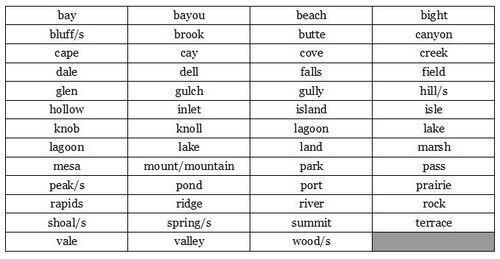
Place Words

Common Suffixes
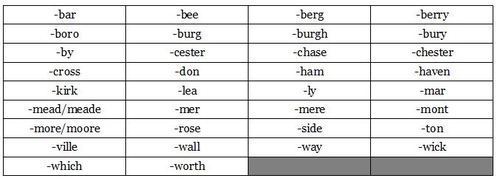
Other Descriptors
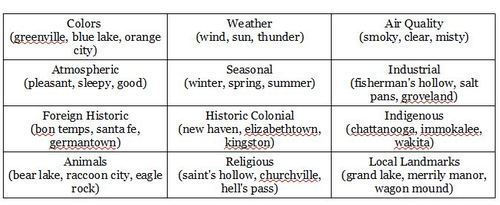
unbothered character dialogue + prompts ⋆.ೃ࿔*:・
@celestialwrites for more!!
♡ “breathing air that you contaminate deeply unsettles me.”
♡ constantly putting their feet on their superior’s desk/table.
♡ “please remind me why you are relevant.”
♡ always commenting at the worst moment possible.
♡ “life was far more peaceful when i thought you were dead.”
♡ when someone is yelling at them, the character pulls out a book and just starts reading.
♡ “i gave my last fuck two decades ago, you’re going to need a time machine to find it.”
♡ sees a dead body and just sighs, turns around and goes to the breakfast diner across the street.
♡ “if he opens his mouth again i’m calling the cops for a noise disturbance.”
♡ has one hobby that they get really prickly about if people interrupt or make fun of it.
♡ “when did you finally decide to be helpful?”
♡ sees another character having a panic attack and asks them to quiet down so they can finish their crossword puzzle.
♡ “maybe if you were as tall as your ego you would have seen it.”
♡ other characters having to remind them to either pretend to care or not speak at all during important meetings/situations.
♡ “i could bring the heavens crashing down, remember that the next time you interrupt my coffee break.”
♡ being the key part of the team’s plan but will continuously sleep in.
REBLOG TO SUPPORT YOUR LOCAL WRITERS!!<3
Ways I Show a Character Is Grieving
They say "It’s fine, I’ve processed it" while clearly processing it through spreadsheets, sarcasm, or passive-aggressive emails.
They treat memories like landmines. They avoid certain songs, places, and foods like they bite and they kind of do.
They hoard weird things. A receipt. A voicemail. A cracked mug. Objects that wouldn’t matter to anyone else but now feel sacred.
They laugh at really inappropriate times. At funerals. In therapy. During serious conversations. It’s not funny, they just don’t know what else to do.
They forget things. Not just dates. Entire days. Their brain is buffering because it’s too full of everything they don’t want to feel.
They get too angry at tiny things. The pen runs out? Full mental breakdown. It’s never about the pen.
They say “they wouldn’t want me to be sad” as a way to guilt-trip themselves into pretending they’re not actively falling apart.
Tips from a Beta Reading Writer
This one's for the scenes with multiple characters, and you're not sure how to keep everyone involved.
Writing group scenes is chaos. Someone’s talking, someone’s interrupting, someone’s zoning out thinking about breadsticks. And if you’re not careful, half your cast fades into the background like NPCs in a video game. I used to struggle with this so much—my characters would just exist in the scene without actually affecting it. But here’s what I've learned and have started implementing:
✨ Give everyone a job in the scene ✨
Not their literal job—like, not everyone needs to be solving a crime or casting spells. I mean: Why are they in this moment? What’s their role in the conversation?
My favourite examples are:
The Driver: Moves the convo forward. They have an agenda, they’re pushing the action.
The Instigator: Pokes the bear. Asks the messy questions. Stirring the pot like a chef on a mission.
The Voice of Reason: "Guys, maybe we don’t commit arson today?"
The Distracted One: Completely in their own world. Tuning out, doodling on a napkin, thinking about their ex.
The Observer: Not saying much, but noticing everything. (Quiet characters still have presence!)
The Wild Card: Who knows what they’ll do? Certainly not them. Probably about to make things worse.
If a character has no function, they’ll disappear. Give them something—even if it’s just a side comment, a reaction, or stealing fries off someone’s plate. Keep them interesting, and your readers will stay interested too.
basic things you should know about your main characters
how is their relationship with their family
what are their beliefs, if they have any
what is their motivation (preferably something unrelated to their love interest/romantic feelings)
who were they raised to be vs. who they became/are becoming
what are their plans for the future, if they have any
how they feel about themselves and how it affects their behaviour
how do they feel about things they cannot control
and last but not least: Why is This Character the Protagonist??
hi dhaaruni! i want to learn about radical feminism, could you rec some books/texts? thank you <3

YES.
Right-Wing Women, Woman Hating, and Letters From a War Zone by Andrea Dworkin
Are women human?, Only Words, and Toward a Feminist Theory of the State by Catharine A. MacKinnon
The Second Sex by Simone de Beauvoir
The Politics of Reality: Essays in Feminist Theory by Marilyn Frye
Sexual Politics by Kate Millett
Sister Outsider by Audre Lorde
The Feminine Mystique by Betty Friedan
Women, Race, & Class by Angela Davis
Invisible Women: Data Bias in a World Designed for Men by Caroline Criado Pérez
This Bridge Called My Back by Cherríe Moraga and Gloria E. Anzaldúa
The Industrial Vagina: The Political Economy of the Global Sex Trade by Sheila Jeffreys
Against Our Will: Men, Women, and Rape by Susan Brownmiller
We Should All Be Feminists by Chimamanda Ngozi Adichie
Material Girls: Why Reality Matters for Feminism by Kathleen Stock
Of Woman Born: Motherhood as Experience and Institution by Adrienne Rich
The Beauty Myth by Naomi Wolf (it was published in 1990 before Wolf went cuckoo for cocoa puffs)
On Rape and Sex and Destiny: The Politics of Human Fertility by Germaine Greer
Bad Feminist by Roxane Gay (just never look at her Twitter if you haven't already since this book really is very good and her Twitter ensured I'm never reading another book of hers ever)
And thank you for enjoying my newsletter!!
-
 bigolidioot liked this · 1 month ago
bigolidioot liked this · 1 month ago -
 bootifulprincessdisorder liked this · 1 month ago
bootifulprincessdisorder liked this · 1 month ago -
 tzpsolangelo liked this · 1 month ago
tzpsolangelo liked this · 1 month ago -
 gratefullearner liked this · 1 month ago
gratefullearner liked this · 1 month ago -
 bigbowlacereal liked this · 1 month ago
bigbowlacereal liked this · 1 month ago -
 irunanamaturewritingblog reblogged this · 1 month ago
irunanamaturewritingblog reblogged this · 1 month ago -
 alongwiththefucksigive liked this · 1 month ago
alongwiththefucksigive liked this · 1 month ago -
 strangesnakewithlegs liked this · 1 month ago
strangesnakewithlegs liked this · 1 month ago -
 ghoulsonata liked this · 1 month ago
ghoulsonata liked this · 1 month ago -
 alastorwhumped liked this · 1 month ago
alastorwhumped liked this · 1 month ago -
 yuunarichu liked this · 1 month ago
yuunarichu liked this · 1 month ago -
 jinxthefox liked this · 1 month ago
jinxthefox liked this · 1 month ago -
 the-west-windz liked this · 1 month ago
the-west-windz liked this · 1 month ago -
 icycutie liked this · 1 month ago
icycutie liked this · 1 month ago -
 eyy-ya-boi liked this · 1 month ago
eyy-ya-boi liked this · 1 month ago -
 furiousblacktiger liked this · 1 month ago
furiousblacktiger liked this · 1 month ago -
 benjami-1 liked this · 1 month ago
benjami-1 liked this · 1 month ago -
 tournesun liked this · 1 month ago
tournesun liked this · 1 month ago -
 tata-is-the-name liked this · 1 month ago
tata-is-the-name liked this · 1 month ago -
 moonsincere liked this · 1 month ago
moonsincere liked this · 1 month ago -
 rainhunter900 reblogged this · 1 month ago
rainhunter900 reblogged this · 1 month ago -
 rainhunter900 liked this · 1 month ago
rainhunter900 liked this · 1 month ago -
 revyluvr liked this · 1 month ago
revyluvr liked this · 1 month ago -
 hvneylvndr liked this · 1 month ago
hvneylvndr liked this · 1 month ago -
 yuchan44 liked this · 1 month ago
yuchan44 liked this · 1 month ago -
 raylaandcallum reblogged this · 1 month ago
raylaandcallum reblogged this · 1 month ago -
 raylaandcallum liked this · 1 month ago
raylaandcallum liked this · 1 month ago -
 cosmicdreamers liked this · 1 month ago
cosmicdreamers liked this · 1 month ago -
 sweetbloulou liked this · 1 month ago
sweetbloulou liked this · 1 month ago -
 graycarver liked this · 1 month ago
graycarver liked this · 1 month ago -
 wybiesired reblogged this · 1 month ago
wybiesired reblogged this · 1 month ago -
 ohhoneydoll reblogged this · 1 month ago
ohhoneydoll reblogged this · 1 month ago -
 madsipie liked this · 1 month ago
madsipie liked this · 1 month ago -
 sparklingsilvermagnolias reblogged this · 1 month ago
sparklingsilvermagnolias reblogged this · 1 month ago -
 arkhamleclerc liked this · 1 month ago
arkhamleclerc liked this · 1 month ago -
 jasbutt liked this · 1 month ago
jasbutt liked this · 1 month ago -
 ihatecoconut liked this · 1 month ago
ihatecoconut liked this · 1 month ago -
 periwinkle-of-ireland liked this · 1 month ago
periwinkle-of-ireland liked this · 1 month ago -
 dabiscrispypp liked this · 1 month ago
dabiscrispypp liked this · 1 month ago -
 primordialsquirrel liked this · 1 month ago
primordialsquirrel liked this · 1 month ago -
 defender-of-wilderness liked this · 1 month ago
defender-of-wilderness liked this · 1 month ago -
 sparkly-arcade-theorist liked this · 1 month ago
sparkly-arcade-theorist liked this · 1 month ago -
 callmeshehrazad liked this · 1 month ago
callmeshehrazad liked this · 1 month ago -
 melethreblogs liked this · 1 month ago
melethreblogs liked this · 1 month ago -
 firesidefantasy reblogged this · 1 month ago
firesidefantasy reblogged this · 1 month ago -
 sapphic-story reblogged this · 1 month ago
sapphic-story reblogged this · 1 month ago -
 lesbiassoon liked this · 1 month ago
lesbiassoon liked this · 1 month ago -
 ednosanad liked this · 1 month ago
ednosanad liked this · 1 month ago -
 lumimisu liked this · 1 month ago
lumimisu liked this · 1 month ago

119 posts







